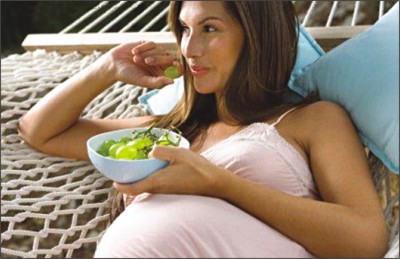Children whose mothers had a diet rich in nutrients, during pregnancy, had a much more healthy birth than children whose mothers had a diet low in nutrients. Mothers should take into account the amount of nutrients from food rather than quantity of food or energy consumption.
A poor diet can affect pregnancy
A diet poor in nutrients in the first trimester (first three months) may affect embryonic development and its ability to survive. A diet low in nutrients before pregnancy, affects the normal growth of the fetus. Consumption of nutrients should be higher during the third (and last) quarter.
What is a nutritious diet ?
Principles of good eating habits are based on:
– How many fruits and vegetables you eat
– Lean meat, especially red
– Cereals and nutrient intake
– Dairy
– Foods with low salt intake
– Few fried foods and fats
– Adequate protein
– Some fats and oils, in particular mono-unsaturated and poly-unsaturated.
Recommendations for daily intake
– 125 grams of meat / fish
– 450-600 ml of milk (or equivalent in yogurt; 50 grams of cheese; 80-100 grams or calcium fortified soy milk)
– Five servings of vegetables (one serving equals 1 / 2 cup)
– Eight slices of bread (one slice of bread can be substituted for one cup of rice / pasta or a bowl of cereal).
Iron and anemia
Pregnancy places substantial demands on iron in the body. This is caused by the increased blood circulation, as well as the growing fetus and placenta. Iron intake is especially important during the third quarter, where there is a large iron transfer from mother to child. Around 10-15 percent of pregnant women are iron deficient, compared with 4 percent of women who are not pregnant. Insufficient iron can lead to anemia. Symptoms include excessive fatigue.
Anemia during pregnancy was associated with:
– Increased risk of abortion
– Birth of underweight children
– Retardation or fetal death
– Increased blood pressure later in the newborn.
Foods rich in iron include the following:
– Red meat
– Nuts
– Some vegetables
– Bird liver and kidneys
– Bread and cereals with added iron.
The recommended daily dose of iron
Recommended daily intake of iron during pregnancy is 22-36 mg (10-20 mg more than the period before pregnancy). Amount needed depends on the amount of iron the mother has accumulated in the body prior to pregnancy. If the accumulated reserves of iron in the body of a woman are low, she may need iron supplements based products. These supplements are regularly recommended for pregnant women because it is difficult to assimilate the necessary amount of iron from food alone, especially if the woman does not eat red meat. However, iron based supplements can cause constipation.
Some foods can affect iron absorption
To make it more difficult taking iron in the diet, some foods, such as tea, spinach, cereals and foods rich in calcium, may influence iron absorption in the body. The good thing is that vitamin C helps the absorption of iron in the body. So, to help the body absorb as much iron, must be consumed as many foods rich in vitamin C (such as a large variety of fruits and vegetables, especially green pepper, tomatoes and orange juice) and to give up drinking tea or milk between meals.
Continue to the next page to read the full article:

